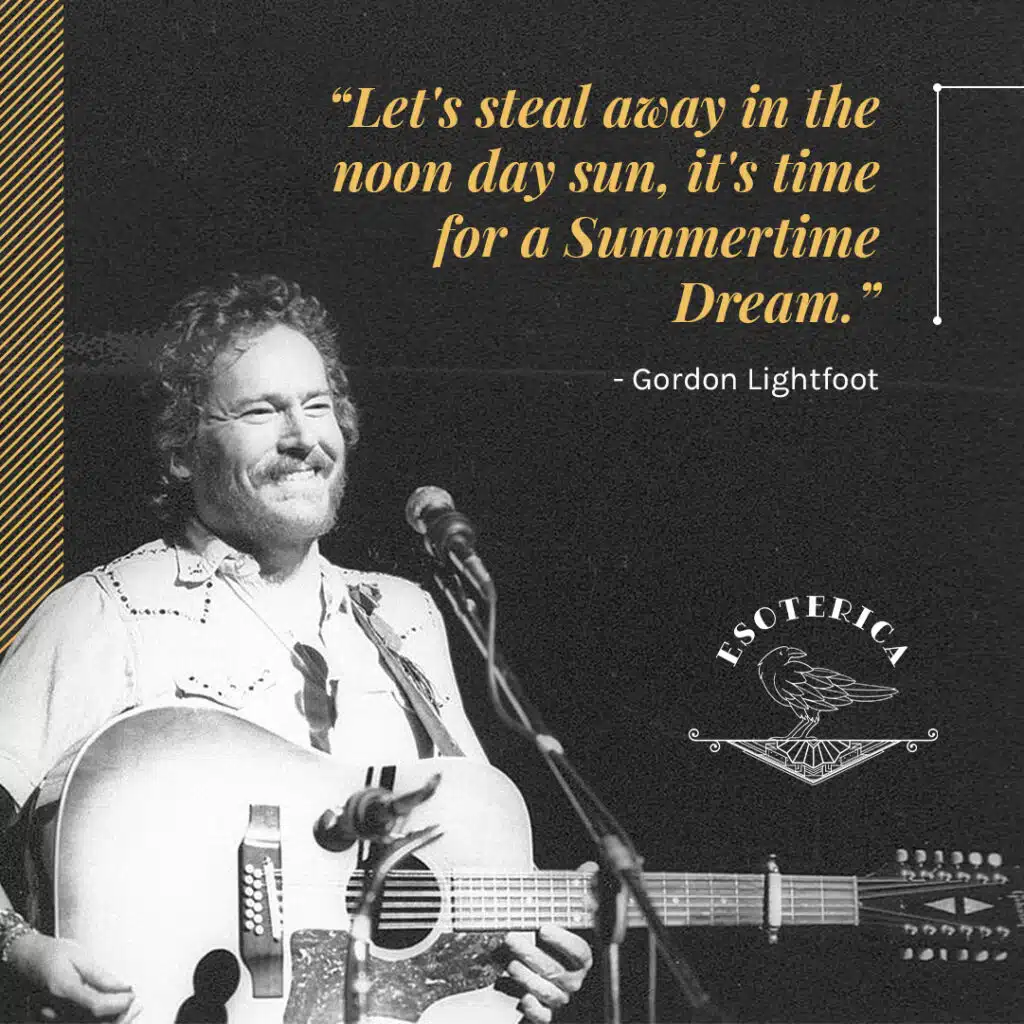By Bruce Farrell Rosen,
He had opened the show that night of June 9, 1978 at the Santa Barbara County Bowl with the words to Summertime Dream. It was that time between finishing up the senior year of college at U.C. Santa Barbara and graduation ceremony just a few days away. The early summer sun had begun to warm the hillsides of the verdant bowl, and by the the time the show started the gentle cooling from the Pacific Ocean had begun to settle.
The night was magic, further enhanced by having just met Allison, a girlfriend whom I’ve never forgotten, about a month earlier, the entire moment awash in the sipping of wine and anticipation of Gordon Lightfoot. It was the end of several years of hard studying and there could be no greater bliss in life than when Gordon opens the show with “Let’s steal away in the noon day sun, it’s time for a Summertime Dream.”
Gordon Lightfoot has just passed, but the light of his genius will nurture our hearts forever. It is a genius to tell us stories with such depth and simplicity that the meaning of life becomes clear in his songs. Bob Dylan has said that “when he hears a Gordon Lightfoot song he never wants it to end.”
Dylan in his inimitable way produced a version of Lightfoot’s Early Morning Rain for his ‘Self Portrait’ album. The opening brings in his soulful and melodic harmonica, and unfolds in an easy way with shadings of Spanish guitar. It’s images lean to ‘South of the border’, unlike Gordon’s version which invokes a cold Canadian morning. It is a gorgeous version and captures the essence of the masterpiece. It is an ultimate tribute to Gordon Lightfoot.
I had not heard the song Early Morning Rain when, in 1971, at the age of sixteen I had the yearning and wanderlust to break free from the tyranny of a sometimes hostile father–my hair was too long, friends not acceptable, a spirit that he had tried his best to repress–and hop freight trains across America.
It was not a time of cell phones or voice messages, and I can only imagine the dread that this caused for my parents during the few weeks I had been gone. I had tried to call home a few times along the way but to no avail–there had not been an answer.
By the time I reached the outskirts of Chicago, my mom finally answered. She had arranged for me to fly back, the first time I had ever been on a plane. I objected by saying that I wanted to come back the same way that I arrived, by hopping freights. I could not stand the torture in her voice and, of course, came back the way she wanted.
Ever since that time I can say that I know what Gordon Lightfoot means when he sings, “In the early morning rain, with a dollar in my hand, with an aching in my heart and my pockets full of sand…you can’t jump a jet plane, like you can a freight train, so I’d best be on my way in the Early Morning Rain…”
Not long after returning from the rails, my mom sat me down to listen to a song she felt that I had to hear, that I would love, that would intrigue and captivate me. She wanted me to think of its meaning. The album had been well worn and there was a bit of a crackle as the stylus worked its way into the song. And then those words, delivered with an hypnotic guitar background, the voice deep, mellow, essential: “If you could read my mind, love what a tale my thoughts could tell, just like an old time movie bout a ghost from a wishing well…and I will never be set free as long as I am a ghost you can’t see…”
It is a song of pure genius, of such deep imagery, of metaphor upon metaphor, layered with meanings that to do this day mean something at one moment and something else at other moments. Just like some of the greatest songs ever presented to mankind, such as ‘Bridge Over Troubled Water,’ written by Paul Simon, there was a time before these songs existed that is so far apart from when they came into being.
The world changes when certain songs are received, and nothing can ever be the same again. Such is the case with “If You Could Read my Mind”. My hearing of it the first time is inextricably linked to my mom (of blessed memory) playing it for me, understanding me, knowing that I would find it fascinating. She did read my mind and appreciated that there “might be many tales my thoughts might tell”.
We moved to California from Toronto when I was quite young. We stayed in California until the age of eleven and moved back to my father’s hometown of Montreal for a year, before a job was offered to him that he accepted in the town of Campbellton, New Brunswick.
The town was a shock to the system for a boy raised in California, but I quickly made friends, skated in outdoor rinks that were never above zero degrees (and had become quite good at playing hockey.) The one winter that we stayed there was bitter cold (sometimes 40 below zero) and a year later we moved back to California, where I continued to play hockey throughout my teens. Campbellton was on the Gulf of Chaleur, adjacent to the Gaspe peninsula. And I never feel more Canadian than when Gordon invokes the soul of Canada in his Canadian Railroad Trilogy. Goodness, am I reminded of this coming of age period in my life when Gordon sings, “So over the mountains and over the plains, into the Muskage and into the rain, Up the St.Lawrence on the way to Gaspe…” In this song the soul of Lightfoot and the soul of Canada are entwined, and I discover a bit of my own soul.
To have loved, lost and loved again, but in a different way, without ownership, pride or possessiveness is something many have experienced, including myself. This feeling is expressed so eloquently, deeply, simply and beautifully in Lightfoot’s “I’m Not Supposed to Care”: “If you think you need someone who needs you, you know I’ll always be there, I’ll do it although I’m not supposed to care…”
A few years ago Gordon Lightfoot was playing at the hillside venue of the stunning Saratoga Winery in Northern California. My cousin Madelyn, living in London, had been close with Gordon during their days in Toronto’s Yorkville. So, when Gordon played London’s Albert Hall they met backstage and enjoyed reconnecting.
I cannot thank her enough for putting me in touch with Gordon’s road manager, who arranged for myself and girlfriend Susan to meet him backstage after the concert. It was a Summer night, with views of the vineyards below the venue. Older in years he still performed almost everything we wanted to hear, and did so with generosity, kindness and still such talent.
And then we met backstage. We were speaking to his band members when Gordon finally arrived. He said that he had noticed us enjoying his concert from the first few rows. I let him know how so deeply gratified I was to be able to meet him. I reminded him that my cousin Madelyn had arranged that for me, and he said ‘ yes, I met her back stage at the Albert Hall, and we were friends back in the day in Toronto.
We took a photo together and it is one that I will always cherish.
During our walk last Summer in London’s Regents Park, Madelyn told me that she had once asked Gordon Lightfoot how it was that he was able to write so many remarkable songs? She said that his answer to her was that he “would only write when he felt that he had something important to say, and that if someone has something important to say, for others to hear they should say it.” Yes, the world will be forever brightened by the words and music of Gordon Lightfoot.
Bruce Farrell Rosen has retired recently after forty years as an investment manager in San Francisco. He is also an author of two books, ” Bombed in his bed the confessions of Jewish Gangster Myer Rush, and ” If you Ever Need Me, I Won’t be far away”. He has authored numerous articles for the BBC, Baseball Hall of Fame, San Francisco Chronicle, Marin Independent Journal and others. He lives in San Francisco, Calif.

